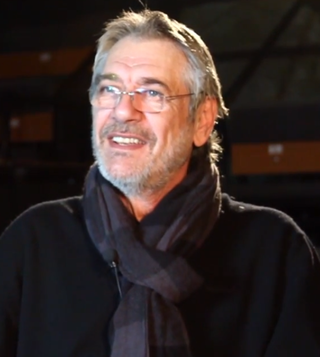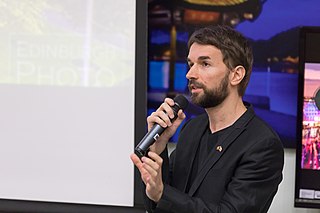
Marcel Iureș is a Romanian actor. He is one of Romania's most acclaimed stage and film actors. He has acted in films and on stage both in Romania and internationally, and has played at least ten roles on Romanian and British television. His work includes voiceovers for Disney and computer games. Iureș is the president and a judge of the Anonimul International Film Festival and also the president of Ideo Ideis Festival.

Teatrul Evreiesc de Stat in Bucharest, Romania is a theater specializing in Jewish-related plays. It is the oldest Yiddish-language theater with uninterrupted activity in the world. Its contemporary repertoire includes plays by Jewish authors, plays on Jewish topics, and plays in Yiddish. Many of the plays also feature Jewish actors.

Costache Caragiale was a Romanian actor and theatre manager who had an important role in the development of the Romanian theatre.

Luminița Gheorghiu was a Romanian film and stage actress and artistic performer in East Central Europe. She achieved international recognition for her roles in The Death of Mr. Lazarescu (2006) and Child's Pose (2013). Gheorghiu's roles were mostly in Romanian and French, including that in Code Unknown with Juliette Binoche.

The National Theatre Bucharest is one of the national theatres of Romania, located in the capital city of Bucharest.

The Union of European Theatres is an alliance of European public theatres. It promotes European integration through cultural interaction.

Teatru Manoel is a theatre and important performing arts venue in Malta. The theatre is often referred to as simply "The Manoel", and is named after Grand Master of the Order of the Knights Hospitaller, Fra António Manoel de Vilhena, who ordered its construction in 1731. The theatre is reputed to be Europe's third-oldest working theatre, and the oldest theatre still in operation in the Commonwealth of Nations.

The Romanian Radio Broadcasting Company, informally referred to as Radio Romania, is the public radio broadcaster in Romania. It operates FM and AM, and internet national and local radio channels. The local stations are branded under the Radio România Regional umbrella.
Lydia Caruana is a Maltese operatic soprano who performs in the opera houses and concert halls of Europe and her native Malta. She has sung in two rarely performed operas by Maltese composers, Carmelo Pace's I martiri and Nicolo Isouard's Jeannot et Colin.

The Kyiv National Academic Molodyy Theatre is a theatre in Kyiv in Ukraine. It was founded in 1979 and first played on 26 April 1980, with a focus on progressive productions. It is also known simply as Molodyy Theatre, and addresses people "young in mind". It is a member of the European Theatre Convention, and became a national institution in 2019.
Miruna Runcan is a Romanian-born writer, semiotician and theater critic. She received a PhD in Theater's Aesthetics from the Bucharest University of Theater and Film in 1999 on a complex historical and aesthetic research on the Romanian modern stage-directing and theater theories, from 1920 to 1960.
Alexander Hausvater is a Romanian-Canadian stage director.
The Transversal Theater Company (TTC) is a nonprofit organization of American and European artists based in Amsterdam. Founded in 2003 by Bryan Reynolds, Lonnie Alcaraz, Douglas-Scott Goheen, and a number of other artists, TTC is an experimental theater company known for creating original performance works that explore charged social, cultural, conceptual, and political realities of today through the combined social-cognitive theory, performance aesthetics, and research methodology known as Transversal Poetics. The products of this praxis or practice research (practice-as-research) approach have been various and far-reaching, including a theory of acting and design aesthetics. TTC has toured productions to festivals and other venues in the United States, Europe, the Middle East, and Asia, such as to the national theaters of Poland and Romania, Armenia's HIGH FEST, Romania's National Theatre Festival, Sibiu International Performing Arts Festival, and Interferences Festival, the Gdansk International Shakespeare Festival. TTC's core members and contributing artists have included Robert Cohen, Gary Busby, Lonnie Alcaraz, Niels Horeman, David Backovsky, Sky Reynolds, Shira Wolfe, Laila Burane, Christopher Marshall, Saskia Polderman, Luke Cantarella, Alan Terricciano, Christa Mathis, Kayla Emerson, Karyn Lawrence, Amanda McRaven, Michael Hooker, Stan Limburg, Henk Danner, Matthias Quadekker, Babette Holtmann, Mathieu van den Berk, Erik Lint, Alex Hoffman, Sam Kolodezh, Jon McKenzie, Saviana Stănescu, Gosia Lorenz, Emilia Simeonov, Vinnie Olivieri, Sammie Dasia Moore, Jacob Dovan Nguyen, Richard Brestoff, Bob Boross, Oscar Seip, Jessica Dunn, James Intriligator, Jesús López Vargas, and Merle DeWitt III.

The German State Theatre Timișoara is a publicly funded German-language theatre company in Timișoara, Romania, where a German-language theatre was first mentioned in 1753. The new theatre opened in 1875, but closed again in 1899 as a result of increasing Magyarization in the then Kingdom of Hungary. The ceremonial reopening of the German State Theatre Timișoara took place on 27 June 1953. The German State Theatre is located in the right wing of the Palace of Culture with entrance from Alba Iulia Street. It has a 100-seat theatre hall that it shares with the Hungarian State Theatre.
Ana-Maria Bamberger is a playwright of Romanian origin working in Paris, London, Germany, and Romania.

Octavian Saiu is a Romanian scholar and theatre critic.
Alexandru Darie was a Romanian theater director. Born into an acting family, the son of Iurie Darie and Consuela Roșu, he graduated from the Caragiale Academy of Theatrical Arts and Cinematography in Bucharest in 1983. He directed dozens of plays and was the director of the Bulandra Theater in Bucharest from 2002 until his death in 2019. From 2006 to 2011 he was the president of the Union of European Theatres (UTE). He was nominated for and won a number of awards, both at the national level and the international level; his plays were performed in both Romania and abroad.

Anhaltisches Theater Dessau is a theatre in Dessau, Saxony-Anhalt, Germany, which was called Landestheater Dessau until 1984. It is Mehrspartentheater offering drama, musical theatre, ballets, concerts of the Anhaltische Philharmonie orchestra, and puppetry.

The Mihai Eminescu National Theatre is a theatre company in Timișoara, Romania, subordinated to the Ministry of Culture. It shares the same building with the Romanian National Opera, the Csiky Gergely Hungarian State Theatre and the German State Theatre. It was founded in 1945 after decades of concerted efforts to establish a Romanian-language theatre in the city.













